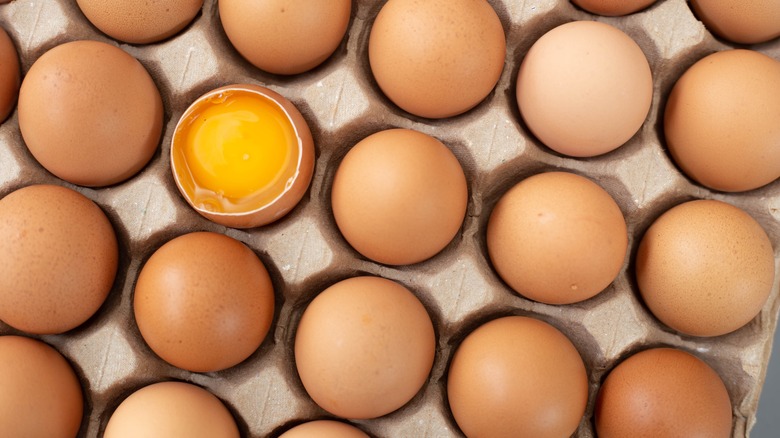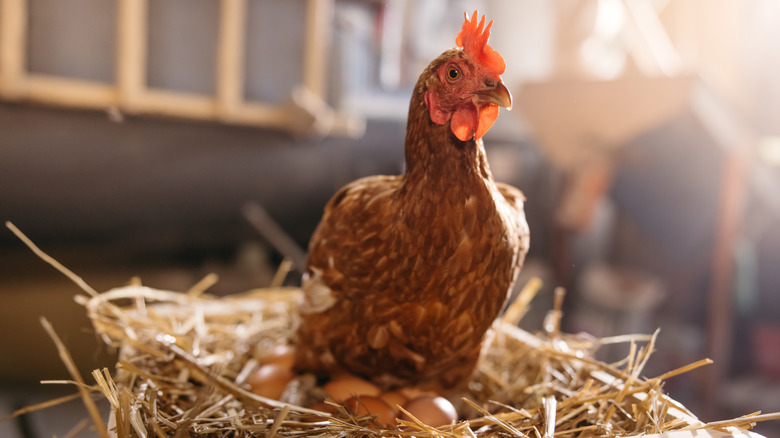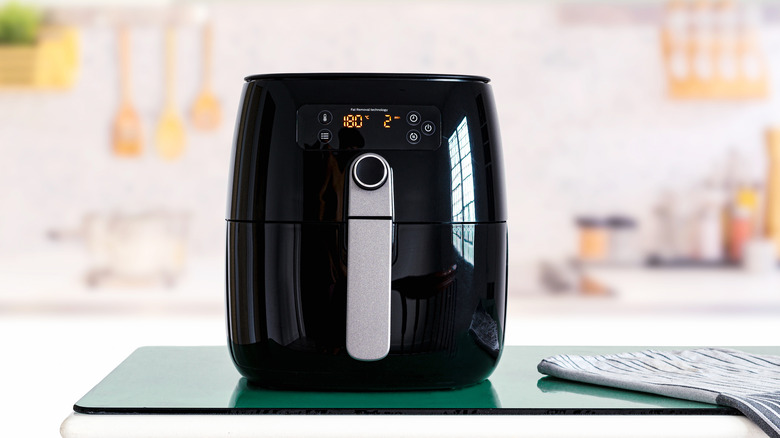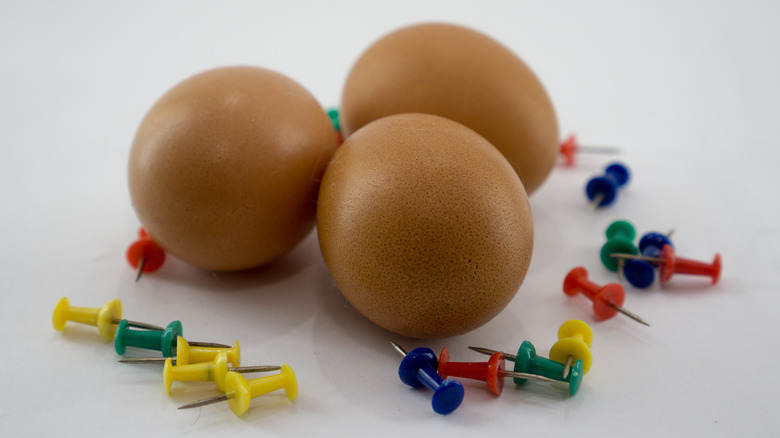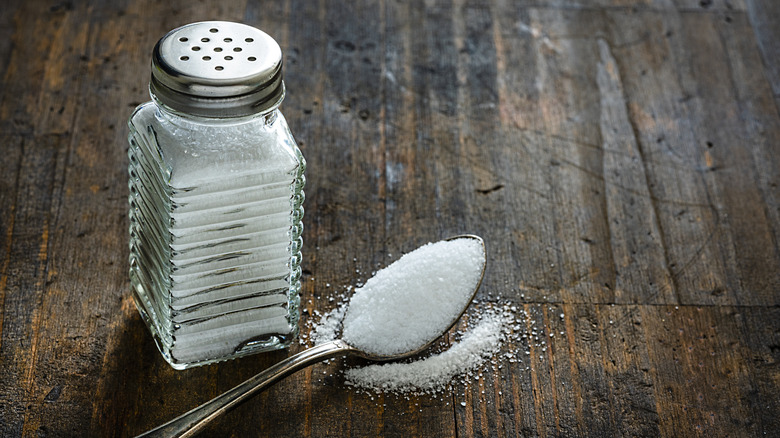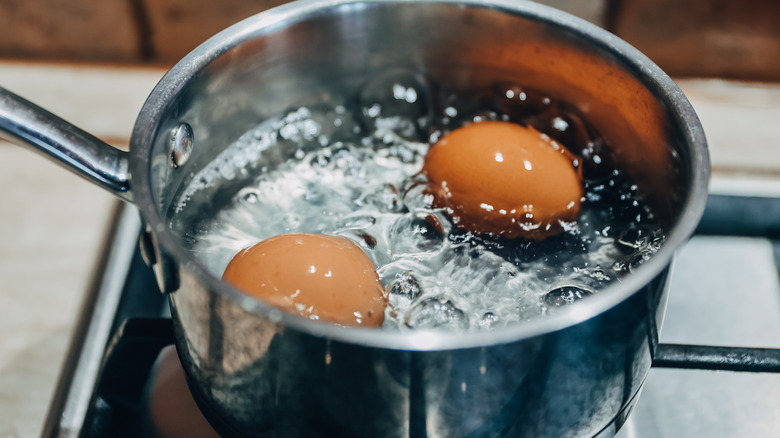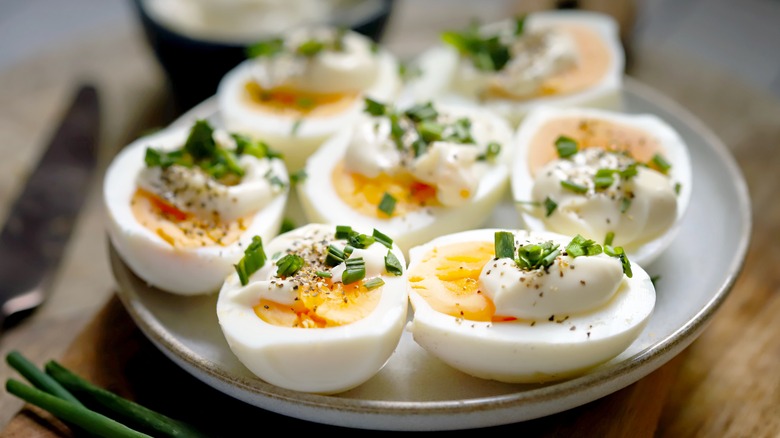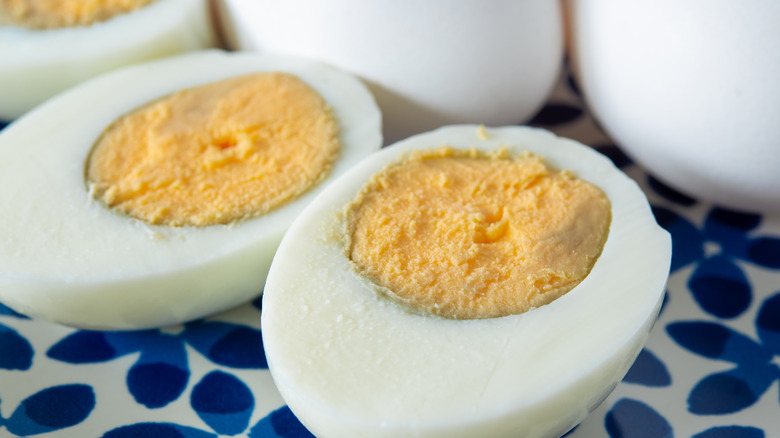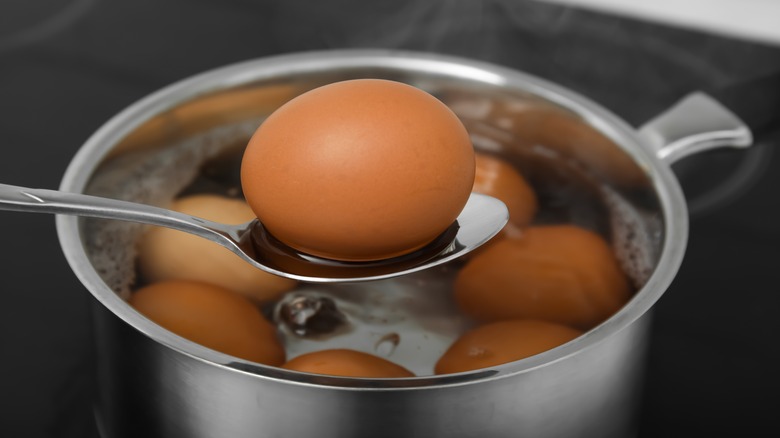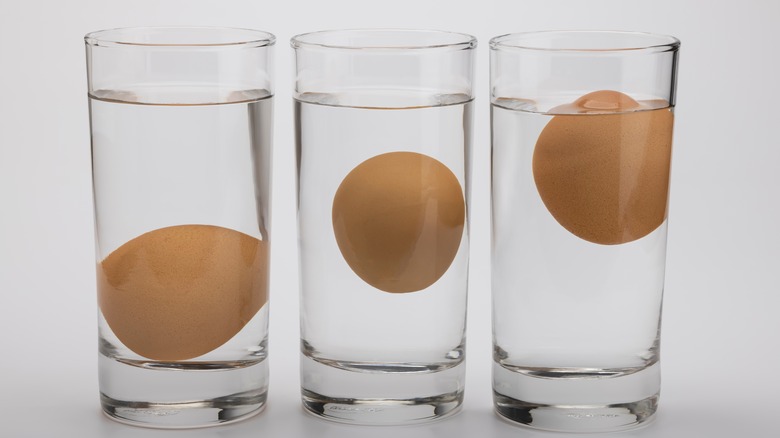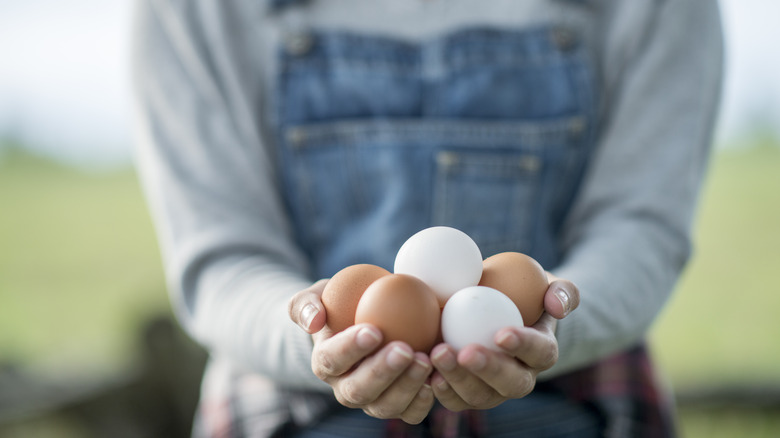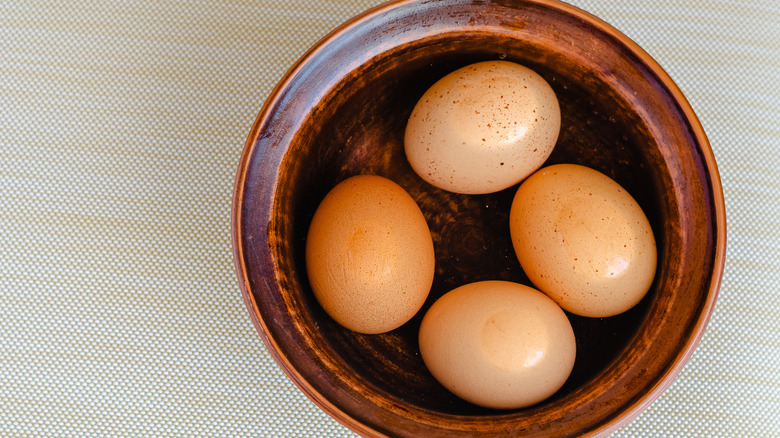False Facts About Hard-Boiled Eggs You Thought Were True
Eggs aren't just delicious, they're a nutritional juggernaut. Packed with vitamins and minerals such as vitamins B2, B5, B12, folate, and selenium, eggs contribute to our overall health and well-being. They're also a rich source for increasing our HDL, the good cholesterol that reduces the risk of heart problems, as well as for delivering choline, which supports various body functions such as cellular growth. In addition, eggs are great for calorie-conscious individuals, with each large egg containing about 78 calories (via Healthline).
Affordable and highly versatile, eggs are a staple in kitchens around the world. Whether scrambled, boiled, poached, or fried, this protein-packed food caters to various tastes and culinary preferences. Among the plethora of cooking methods, hard-boiling stands out as one of the healthiest ways to enjoy eggs. This is because, unlike frying, this method avoids the use of fats. Once hard-boiled, eggs can be eaten as a filling snack between meals or used in a huge number of recipes.
While hard-boiled eggs offer a wealth of healthy culinary options, they are also riddled with misconceptions. Not to worry, however. We are here to clear up any confusion!
Only fresh eggs can be hard-boiled
Raw eggs are surprisingly resilient. According to U.S. Department of Agriculture regulations, the sell-by date on a carton of eggs can't exceed 30 days after the packaging date. Nevertheless, the federal agency also states that eggs can safely be hard-boiled even if they are five weeks old and past their official expiration date. To make your eggs go the distance, the USDA recommends that you pop your eggs in the refrigerator as soon as you get home from the grocery store. Once in the fridge, eggs should be kept in their original carton and away from the fridge door as this area experiences frequent temperature fluctuations as you open and close the fridge.
While it may seem counterintuitive, many people prefer hard-boiling older eggs since they are easier to peel than their fresher counterparts. There's a good reason for this. In newly laid eggs, the egg white sticks to the shell due to a low pH level or acidity. As the egg ages, its shell becomes more porous, which leads to the absorption of air and the release of carbon dioxide. This, in turn, increases the egg white's acidity, reducing its adherence to the shell. In addition, egg whites tend to shrink with time, which results in more air between the whites and the shell — another reason that makes older eggs easier to peel.
You can only make hard-boiled eggs in a saucepan
Boiling eggs in a saucepan is the most common but not the only method for making hard-boiled eggs. In fact, some people view other ways as more foolproof since they leave less room for error. Aside from making eggs in an electric egg cooker, one such method involves using an instant pot. Kristen from A Mind Full Mom recommends following the rule of fives, adding that you should allow your pressure cooker five minutes to heat up, five minutes to cook the eggs, and five minutes to release pressure.
You can hard-boil eggs without water using an air fryer. Simply preheat the appliance to 266 degrees Fahrenheit, place the eggs in the basket, and cook them for 15 minutes. Another waterless way to make hard-boiled — or hard-baked — eggs is by popping them in the oven. For best results, preheat the oven to 325 degrees Fahrenheit, pop the eggs inside (the easiest way is by placing them in a muffin tray), and let them cook for 30 minutes.
The more adventurous home chefs — or those stuck in a kitchen-less hotel room — can opt to boil their eggs in a coffee maker. To get the job done, place the eggs in the glass coffee pot, fill the coffee maker's reservoir with water, and turn the machine on. Let the hot water percolate over the eggs, and once they are immersed in water, let the eggs rest for 10 to 12 minutes (via LeafTV).
Eggs must be poked before boiling to prevent cracking
While some egg enthusiasts swear that pricking the larger end of an egg with a thumbtack prior to boiling is a sure way to stop the eggshell from cracking, this method is dubious at best. The rationale behind this practice is based on the idea that creating a tiny hole in the shell allows the egg's gases to escape, relieving pressure and helping keep the shell intact in boiling water. Piercing an eggshell is also said to let in a little water under the shell, which can make the egg easier to peel once it's hard-boiled (maybe).
According to the American Egg Board, piercing an egg with a thumbtack prior to cooking may do more bad than good. The primary reason for this is that unless the tack is entirely sterile, it could contaminate the egg with harmful bacteria. In addition to this, pricking an eggshell can actually create very tiny cracks, making the eggshell weaker and thus more prone to cracking. One StackExchange user said they had been pricking holes in eggs before boiling them their entire lives. But when questioned about the practice, they decided to do an experiment, boiling pricked and unpricked eggs. The results speak for themselves, they said, adding, "The two pricked eggs cracked, while the non-pricked one was intact."
Adding salt or baking soda to water makes hard-boiled eggs easier to peel
Peeling hard-boiled eggs can be exasperating. As such, it's little wonder that home chefs have come up with a plethora of ways that supposedly make the peeling process easier. Two of these methods involve adding a little baking soda or salt to the water prior to boiling the eggs.
Unfortunately, the majority of cooks who have experimented with both methods seem to have found no discernible difference in peel-ability. Russ Parsons from the Los Angeles Times said that neither adding salt nor baking soda to water made the eggs any easier to peel. In addition, he said that the baking soda actually imbued the eggs with an unpleasant smell of sulfur.
One Quora reviewer, who added not just salt and baking soda to his egg water, but also tried vinegar and cream of tartar, was left unimpressed, adding, "I did the test using the same parameters changing only the additive in the water used to boil the eggs. [...] Guess what ... yeah, that's right ... not a single bit of difference in how the eggs peeled or didn't peel." Another Quora user echoed this sentiment, saying, "I have been cooking eggs for over 70 years and have tried many different additions to the cooking water in an attempt to ease the shell removal of fresh eggs. Salt, baking soda, vinegar. [...] Bottom line, nothing really gave consistent, repeatable results ... old wives tales."
Boiling eggs removes all risk of food poisoning
It's a well-known fact that consuming raw or undercooked eggs can lead to salmonella. However, while many believe that hard-boiling eggs makes it impossible to contract salmonella, this couldn't be further from the truth. While cooking eggs at 160 degrees Fahrenheit kills bacteria, the story isn't necessarily this simple.
Firstly, there's the risk of undercooking your eggs. Even though the process of hard-boiling eggs eliminates most bacteria, including salmonella, the trick lies in ensuring that the egg is cooked all the way through. If the egg isn't boiled for a sufficient amount of time, there's a risk that the center of the egg might not reach the necessary temperature to eradicate all harmful bacteria.
Even if you do happen to kill all bacteria, improper storage of hard-boiled eggs can still lead to food poisoning. Hard-boiled eggs should not be left at room temperature for longer than two hours and should not be stored in the refrigerator for longer than seven days. Once peeled, hard-boiled eggs will start developing bacteria after three days in the refrigerator. Some of the signs that your hard-boiled eggs are destined for the trash include a foul odor; black, brown, or green spots; or slimy or powdery consistency.
Hard-boiled eggs are only good as a snack
While hard-boiled eggs make a delicious snack with a little salt and pepper or mayonnaise, they are also a versatile ingredient that can add flavor and texture to a variety of dishes. So if you find yourself with too many hard-boiled eggs on your hands, there's no need to despair — you have a world of culinary possibilities at your fingertips.
Perhaps the most popular recipe that utilizes hard-boiled eggs is deviled eggs. This classic dish involves halving hard-boiled eggs, removing the yolks, and mixing them with mayonnaise, mustard, and other seasonings — the sky's the limit here. The mixture is then spooned back into the egg white halves. Another straightforward way to use up leftover hard-boiled eggs is by making an egg salad. Simply mash the hard-boiled eggs with mayonnaise, mustard, and a touch of salt and pepper. You can use this egg salad as a sandwich filling, a dip for veggies, or on crackers.
Those wishing to get creative can try their hand at making pickled eggs. To begin, peel the hard-boiled eggs and place them in a jar. Cover the eggs with brine made from a mixture of vinegar, water, sugar, salt, bay leaves, minced garlic, and red onion. You may also wish to infuse the concoction with a little pickling spice. Keep the jar in the fridge for a few days to let the eggs absorb the flavors and enjoy.
Green ring around the yolk of a hard-boiled egg is a sign that it's gone bad
Despite its slightly menacing appearance, a greenish ring around the yolk of a hard-boiled egg is no cause for concern. The discoloration is caused by a chemical reaction between sulfur in the egg white and iron in the yolk. When eggs are overcooked, this reaction can produce ferrous sulfide, which manifests as a greenish hue on the yolk's surface. Alternatively, the green ring can also be the result of boiling eggs in water with a high level of iron.
While not harmful, greenish yolks can be visually unappealing. Luckily, preventing them is relatively simple. All it takes is making sure that you don't overcook the eggs, a misstep that can make eggs not just aesthetically unappealing but also rubbery. Get Cracking offers a recipe for perfectly cooked hard-boiled eggs — and it's not rocket science. Simply place your eggs in a pot with cold water and cover it with a lid. Bring the water to a boil and remove the pot from the heat. If the eggs are large, allow them to rest in the hot water for between 10 and 12 minutes. Adjust this time slightly for eggs of different sizes. After draining the hot water from the pot, refill it with cold water to stop the cooking process inside the shells.
Hard-boiled eggs can be left out at room temperature
Whether hard-boiled, soft-boiled, or anywhere in between, once cooked, eggs should never be left at room temperature for longer than two hours. In the U.S., raw eggs should also be placed in the refrigerator as soon as you get them home from the store. This, however, isn't necessarily the case for every country. In some European countries, for example, eggs are not washed prior to packaging, which means that they retain their protective coating and can be kept at room temperature. Conversely, in the U.S., regulations set by the U.S. Department of Agriculture dictate that eggs must undergo sanitization before packaging. This removes their protective coating, which means that they have to be stored in the refrigerator.
Although hard-boiled eggs should never be kept at room temperature, they can be refrigerated for up to a week as long as they remain in their shells. Hard-boiled eggs can't be stored for as long as their raw counterparts because boiling removes the protective membrane, or egg bloom, inside the shell, making the eggs more susceptible to bacteria. If you store hard-boiled eggs in your refrigerator on a regular basis, there's an easy way to keep track of their freshness. Simply label each eggshell with the egg's cooking date.
Hard-boiled eggs float when they're done
Some people swear that the best way to tell whether an egg is hard-boiled is to check whether it floats in water. While it's true that some eggs float and others sink, the notion that all hard-boiled eggs float is a misconception. The reality is that both hard-boiled and raw eggs are just as likely to float and sink in water.
There're three main reasons why an egg might float in water. Since adding salt to water increases its density, an egg will float once the water reaches a specific level of salinity. Eggs with cracks in their shells also sometimes float in water. This is due to the loss of egg white, which reduces the egg's overall weight, making it more prone to floating. The presence of boiled egg white in the saucepan is a sure sign that one of the eggs didn't make it through the boiling process intact. The third reason why an egg might float in water is simply that it's past its prime. Every egg contains an air cell that expands over time. Once it reaches a certain size, the air pocket keeps the egg buoyant in water.
You can't freeze hard-boiled eggs
If you find yourself with more hard-boiled eggs than you need, you can always freeze them for later use ... well, sort of. The truth is that hard-boiled egg whites don't freeze well. To cut a long story short, when thawed, they turn tough, rubbery, and generally unappetizing. Luckily, hard-boiled egg yolks can be easily frozen for later use. And they are great for use as a garnish and can even be added to baked goods.
For best results, separate the hard-boiled egg yolks and egg whites (use the egg whites in salads or on sandwiches within two days). Pop the egg yolks in a sealable bag, removing as much air as possible, before placing the yolks in the freezer. Don't forget to label the bag with the freezing date, since hard-boiled yolks need to be used within one year of freezing. To thaw the egg yolks, transfer them from the freezer to the refrigerator — they should be ready in about eight hours. If time is of the essence, place the bag with egg yolks in lukewarm water to defrost them.
You can't reheat hard-boiled eggs
Reheating hard-boiled eggs isn't a problem as long as you know what you're doing. Those who say that you can't reheat hard-boiled eggs have probably attempted warming them up in the microwave with disastrous results. This is because microwaves heat up the moisture within food rather than the food itself. When hard-boiled eggs are reheated in a microwave, the pressure within the egg white can build up and lead to an explosion, causing a significant mess and potential burns. This is regardless of whether you're heating up a peeled or an unpeeled hard-boiled egg.
Instead of using a microwave to warm up hard-boiled eggs, pop them in a heat-proof bowl or saucepan, pour boiling water over them, and then cover the pan with a lid. It should take about 10 minutes for the eggs to heat through. If you absolutely insist on reheating eggs in the microwave, place them in a microwave-safe dish filled with water. Once submerged, heat the eggs on medium in one-minute increments until they reach the desired temperature.
